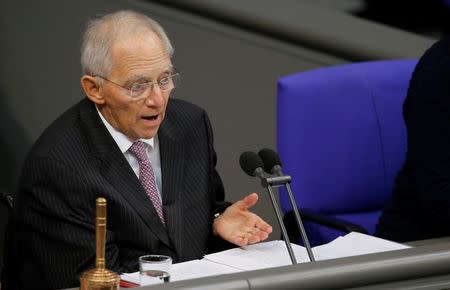Schaeuble does not rule out minority government for Germany

BERLIN (Reuters) - Former German Finance Minister Wolfgang Schaeuble on Saturday urged quick formation of a new government by Chancellor Angela Merkel's conservatives and Social Democrats, but said he could not rule out a minority government if no deal is reached.
Germany's constitution did not favour a minority government, but that remained an option, Schaeuble, a leading conservative who is now president of the Bundestag lower house of parliament, told the Tagesspiegel newspaper.
A deal between Merkel's conservative camp (Union) and the centre-left (SPD) is the German leader's best chance of securing a fourth term in office, but her possible coalition partners are angling for concessions before talks start next week.
"A stable alliance between the Union and the SPD would be preferable," Schaeuble said, adding that the chancellor could still form a minority government. "It would work one way or another," he said when asked about that possibility.
Coalition talks should be completed "sooner rather than later," he said, noting that the Bundestag was not fully capable of action until a government had been formed.
He noted that German President Frank-Walter Steinmeier had urged the political parties to reach an agreement as soon as possible, and said Merkel and other politicians had supported that call.
Horst Seehofer, head of the CSU Bavarian sister party of Merkel's conservatives, told Germany's DPA news agency a new "grand coalition" should be completed by Easter, which falls on April 1 in 2018.
Seehofer said he favoured new elections over a minority government.
Social Democrats on Saturday rejected a call by the CSU to raise military spending, complicating exploratory talks due to start among the parties on Jan. 7.
A draft CSU resolution seen by Reuters on Friday called for military spending to reach NATO's target of two percent of economic output and rejected the idea of an "ever closer" European Union backed by SPD leader Martin Schulz.
SPD deputy leader Ralf Stegner said on Twitter that his party was focused on spending for families, education, health care and education. He said the CSU could implement its military spending plans "when it wins the absolute majority."
A new poll conducted for Die Welt newspaper showed waning support for Merkel, who has failed to form a new government three months after national elections.
It showed that 46 percent wished Merkel would resign immediately as chancellor, with an additional 17 percent of those polled saying that she should resign if the coalition talks with the SPD collapsed.
(Reporting by Andrea Shalal; Editing by Stephen Powell)

